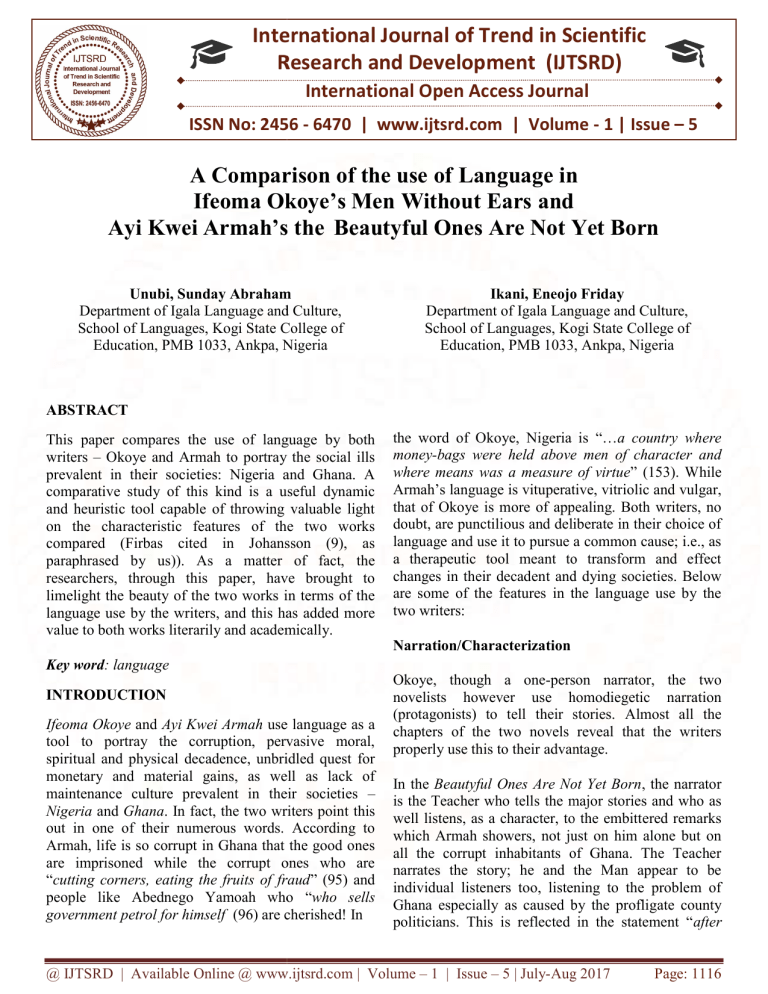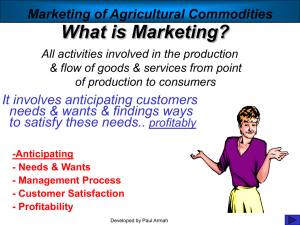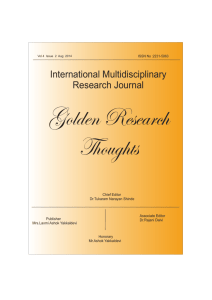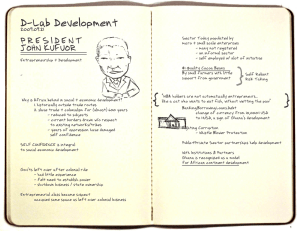
International Journal of Trend in Scientific
Research and Development (IJTSRD)
International Open Access Journal
ISSN No: 2456 - 6470 | www.ijtsrd.com | Volume - 1 | Issue – 5
A Comparison of the use of Language in
n
Ifeoma Okoye’s Men Without Ears and
nd
Ayi Kwei Armah’s tthe Beautyful Ones Are Not Yet Born
Unubi, Sunday Abraham
Department of Igala Language and Culture,
School of Languages, Kogi State College of
Education, PMB 1033, Ankpa, Nigeria
Ikani, Eneojo Friday
Department of Igala Language and Culture,
School
ool of Languages, Kogi State College of
Education, PMB 1033, Ankpa, Nigeria
ABSTRACT
This paper compares the use of language by both
writers – Okoye and Armah to portray the social ills
prevalent in their societies: Nigeria and Ghana. A
comparative study of this kind is a useful dynamic
and heuristic tool capable of throwing valuable light
on the characteristic
racteristic features of the two works
compared (Firbas cited in Johansson (9), as
paraphrased by us)). As a matter of fact, the
researchers, through this paper, have brought to
limelight the beauty of the two works in terms of the
language use by the writers,
rs, and this has added more
value to both works literarily and academically.
Key word: language
INTRODUCTION
Ifeoma Okoye and Ayi Kwei Armah use language as a
tool to portray the corruption, pervasive moral,
spiritual and physical decadence, unbridled quest for
monetary and material gains, as well as lack of
maintenance culture prevalent in their societies –
Nigeria and Ghana. In fact, the two writers point this
out in one of their numerous words. According to
Armah, life is so corrupt in Ghana that the good ones
are imprisoned while the corrupt ones who are
“cutting
cutting corners, eating the fruits of fraud
fraud” (95) and
people like Abednego Yamoah who “who sells
government petrol for himself (96) are cherished! In
the word of Okoye, Nigeria is “…a
“… country where
money-bags
bags were held above men of character and
where means was a measure of virtue”
virtue (153). While
Armah’s language is vituperative, vitriolic
vitr
and vulgar,
that of Okoye is more of appealing. Both writers, no
doubt, are punctilious and deliberate in their choice of
language and use it to pursue a common cause; i.e., as
a therapeutic tool meant to transform and effect
changes in their decadentt and dying societies. Below
are some of the features in the language use by the
two writers:
Narration/Characterization
Okoye, though a one-person
person narrator, the two
novelists however use homodiegetic narration
(protagonists) to tell their stories. Almost all the
chapters of the two novels reveal that the writers
properly use this to their advantage.
In the Beautyful Ones Are Not Yet Born,
Born the narrator
is the Teacher who tells the major stories and who as
well listens, as a character, to the embittered
embitt
remarks
which Armah showers, not just on him alone but on
all the corrupt inhabitants of Ghana. The Teacher
narrates the story; he and the Man appear to be
individual listeners too, listening to the problem of
Ghana especially as caused by the profligate
proflig
county
politicians. This is reflected in the statement “after
“
@ IJTSRD | Available Online @ www.ijtsrd.com | Volume – 1 | Issue – 5 | July-Aug
Aug 2017
Page: 1116
International Journal of Trend in Scientific Research and Development (IJTSRD) ISSN: 2456-6470
each telling of the story the teller would ask, as if he
had been speaking to the air, why men should stand
apart and disappoint themselves when people free to
choose, choose what they want?” (80). Also, this
reveals that the Teacher disapproves of corrupt
materialism and ostentation.
Furthermore, apart from the Teacher, there are other
characters like Koomson, Maanan, Yamoah,
Zacharias, Amankwa, Aboliga, etc whose roles add
aesthetic to the novel.
On the other hand, the homodiegetic characters in
Ifeoma Okoye’s Men Without Ears are Chigo and
Father. They tell us more about the profligacy, getrich-quick syndrome and corruption of Uloko. In one
of the instances, Father tells Chigo, “… Uloko has
turned into a hard and scheming man who will do
anything to get money and go to any lengths to show
his wealth” (49). Moreover, Chigo declares, “… he
had borrowed some money from me because he had
none to pay up a debt…” (66). In terms of
characterization, other characters like Anny, Adaego,
Oyibo, Amaeze, Nweke and so on, play important
roles that add beauty and flavour to the novel.
his resentment, and what can be described as his deep
contempt for black politicians, who after using the
people to gain political power, turn against them and
exploit them.
Others are: “Your mother’s rotten cunt!” (9),
“VAGINA SWEET” (106), “Young juicy vaginas
waiting for him in some hired place paid by the
government” (86). It may appear that the writer is
portraying his blatant disrespect for the carnal parts of
the human body, but this is not the case. It is rather to
expose and severely criticize the politicians’ wanton
sexual abuse and corrupting of young girls. Also, the
consequence of this raw, inelegant and shocking
language is, therefore, to expose the pervasive and
heightened moral decadence in the political corridors
and the entire fabric of Ghana.
On her part, Ifeoma Okoye in Men Without Ears does
not use vulgar language but humane, elegant and
polite language to expose corruption in her country
(Nigeria), and appeals for change of attitude.
However, both writers have a common denominator,
that is, to effect changes in their societies. Though
Okoye uses humane language, it is pungent and
perspicacious enough to achieve this purpose.
Vulgarity/Scatology
Ellipsis
Anyone who has read Armah’s The Beautyful Ones
Are Not Yet Born knows that he explores vulgar,
obscene, indecent and unconventional language to
expose rust and rottenness in his Ghanian society.
However, the irony is that the writer’s vulgarity rather
adds to the artistic and aesthetic quality of the novel.
This language is uniquely and deliberately crafted this
way to serve as an electroconvulsive tool. In other
words, it is intended to shock the readers to
calculatingly draw their consideration to the
dreadfully shocking and repulsive things and
behaviours like corruption, materialism moral
degeneration, filth and the pervasive moral, spiritual
and physical deterioration in the society in order to
effect a change. The fact here is that Armah depicts
corruption to discuss the theme of corruption. Some
of the examples of this are:
“You bloody fucking son of a bitch!”(6),
“Uncircumcised baboon” (9), “Moron of a frog” (9)
“…to shit in their people’s faces…” (82), “…seen
their arseholes and drawn away in disgusted
laughter?” (82). Here the writer’s use of insults belies
Both writers adroitly make use of ellipsis to add
flavour to their works. On his part, Armah appears to
have made use of marked ellipsis in his novel to show
that corrupt practices or statements stick to the mouth,
and as such, they are sometimes avoided completely,
hence, the use of the dots to represent the unvoiced
words, phrases and ideas. For example, Oyo’s mother
says “thought… (138). Here, the narrator states that in
the middle of what she wants to say, something seems
to have struck her mind and she stops. Other examples
are: “the food is fine but the drink… (115), “But when
man is alone here all through the night…” (15),
“…serving our own selves…” (86), “…in the end, we
are our own enslavers first” (86), “It is about the
Ahead…” (135).
On her part, Okoye’s examples of the use of ellipsis
are as follows: “Wash a pig, oil a pig…” (60), “It
pains me greatly to see a well-brought up son change
overnight into a…” (49), “Yes…” (137).
@ IJTSRD | Available Online @ www.ijtsrd.com | Volume – 1 | Issue – 5 | July-Aug 2017
Page: 1117
International Journal of Trend in Scientific Research and Development (IJTSRD) ISSN: 2456-6470
Analepsis and Prolepsis
Another heuristic device used by Armah in the
portrayal of corruption in the novel is analepsis and
prolepsis. These terms are preferred to the terms of
flashback and flash-forward which they stand to
represent. In this sense, Ghana has been
metaphorically reflected as an ‘old man-child’ as
represented by the story told by Aboliga, the frog.
According to the story, the picture is of the “manchild in its grey old age, completely old in everything
save for the smallness of its size” (63).
Ghana is a newly independent country but deep in
corruption, just like the man-child looks “irretrievably
old, far more thoroughly decayed than any other
ordinary old man” (63). On the other hand, Armah’s
implantation of the character and the quality of the
Man- a man standing different in the face of corrupt
and dissident society, is proleptic of the hope of a
better society which will be born in future.
On her part, this language device is not very visible in
Okoye’s Men Without Ears. However, a semblance of
analepsis (flashback) is Chigo’s desire to go back to
Tanzania “ I wish I could go back to Tanzania” (125).
Repetitions
No doubt, both writers use repetition for the sake of
emphasis. The writers in their novels repeat some
words, phrases or clauses to catch the attention of
their readers. They include:
Ayi Kwei Armah: “And Jesus wept, Aha Jesus
wept” (4), “Preferably Maanan,…’Preferably
Maanan…’preferably Maanan” (87), “…Money
swine, Money swine” (110).
Ifeoma Okoye: “You don’t seem to understand the
impropriety of the thing you want me to do for
you. You don’t seem to understand that what you
want me to do for you could ruin my career”
(124), “I can’t” “I just can’t. It’s not done” (124).
while that of Ifeoma Okoye’s Men Without Ears are
more or less traditional and hyperbolic. Some of the
examples are as follows:
Ayi Kwei Armah: “His Excellency”, “Minister
Plenipotentiary”, “Hero of Socialist Labour” (56),
“Professor”, “The Attorney General” (133).
Ifeoma Okoye: “Young Millionaire”, Madam
Cash”, “Money Maker”, “Madam True Money”
(24), etc.
Pidgin English
Both writers use pidgin artistically to add aesthetic
quality to their novels. Some of the instances of
pidgin in the novel include:
Ayi kwei Armah: “Aaah, contrey broke oo,
countrey no broke oo, we dey inside” (82),
“…mah contery people no happy, sah” (83),
“MONEY SWEET PASS ALL”, “WHO BORN
FOOL”, “SOCIALISM MAKE I CHOP”, “YOU
BROKE NOT SO?”, “JAILMAN CHOP FREE”
(106).
Ifeoma Okoye: “… you de travel, sir?... you don
get boarding pass, sir?... I fit help you get one,
sir… just give me fifty naira, sir… you go see.
Maybe you new for this place. Nobody fit give you
boarding pass unless you give am money” (2).
Code-Mixing
Both authors bring their native language into English.
This does not mean lack of adequate vocabulary on
their parts but aptly and artfully done with a view to
spicing up the language. Some of them include:
Ayi kwei Armah: “kenkey” (8), “juju” (18),
“kente” (28), “Da” (107), “obuasi” (108), “fufu”
(110).
Ifeoma Okoye: “agbada” 910), “buba”(20), “Obi”
(32), “Igwe” (37), “ofala” (42), “Oga” (106).
The Use of Symbols
Titles
The two novelists use titles in their novels. These
titles exude some feeling of pomposity and
importance in the characters involved. By contrast,
the titles in Ayi Kwei Armah’s The Beautyful Ones
Are Not Yet Born are more of official and professional
Both writers use symbols to add colour and aesthetic
to their works. In The Beautyful Ones Are Not Yet
Born, one bus appears at the beginning of the novel
and another at the end. The buses are essentially the
same, in spite of the second one looking deceptively
bright and new. The new bus bears the motto: “The
@ IJTSRD | Available Online @ www.ijtsrd.com | Volume – 1 | Issue – 5 | July-Aug 2017
Page: 1118
International Journal of Trend in Scientific Research and Development (IJTSRD) ISSN: 2456-6470
Beautyful Ones Are Not Yet Born” (183). The misspelling of the word ‘beautiful’ symbolically seems to
warn the Ghanian masses not to expect so much from
it. In addition, the drivers and conductors of these
buses are more subtle in their corrupt dealings. The
buses symbolize the Ghanian populace or nation
while the drivers and conductors symbolize the entire
leadership of the nation. Furthermore, the nakedness
of the Teacher symbolizes the death of Ghana until
the ‘beautyful’ ones who will redeem the country
from its state of dilapidation and ruin are born. In the
word of the novel, “There is salvation of some kind, of
course, said the naked man, but only within the cycle
of our damnation itself`” (56).
In Men Without Ears, the statement: “The setting
sun…casting a beam on his face” (132) is symbolic.
The sun symbolizes Chigo’s father while its setting
symbolizes his death.
The Use of Oxymoron
Both authors use this literary device of placing
incongruous or contradictory terms side by side in
order to spice up their writing. In Armah, we find
examples of such as: “waking sleeper” (15), walking
in his sleep”, “sleepwalker” (33) and (34). In Okoye,
the phrase: ‘thrive in disorderliness’ (1) is an
example.
WORKS CITED
1) Adedimeji, Mahfouz. Word Structure in English.
Department of English, Faculty of Arts,
University of Ilorin, Nigeria. 2005. Print.
2) Armah, Ayi Kwei. The Beautiful Ones are Not Yet
Born. Heinemann Publishers (pty) Limited, 1986.
Print.
3) Chukwuloo, Chukwueloka Christian. Portrayal of
Corruption as Narrative in The Beautyful Ones
Are Not Yet Born. Volume 5. African Research
Review
(2011),
71
–
82.
http://dx.doi.org/10.4314/ accessed on 22nd
August,
2017.
4) Johansson, Stig. Contrastive Analysis and Learner
Language: A Corpus-based Approach. University
of Oslo, 2008. Print.
5) Kakraba, Alexander Dakubo. Ayi Kwei Armah’s
Vulgar Language in The Beautiful Ones are Not
Yet Born, a Therapeutic Tool. Maxwell Scientific
Organization, 2011. Print.
6) Okoye, Ifeoma. Men Without Ears. Mageb
Printers Ltd, 1984. Print.
CONCLUSION
It is pertinent to point out once and again that both
writers have a similar theme: to expose corruption,
oppression, moral degeneration as well as the
unbridled quest or desire for money and material
gains, and to effect a desirable change in their
societies – Nigeria and Ghana. This they have
decided to do artfully and uniquely through the use of
language. Indeed, words have the potentiality to heal,
save, kill, make and mar. An English proverb says:
“words cut keener than knives” (Adedimeji, 18).
@ IJTSRD | Available Online @ www.ijtsrd.com | Volume – 1 | Issue – 5 | July-Aug 2017
Page: 1119



